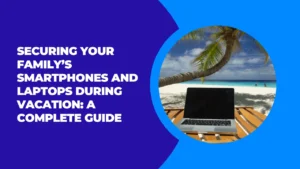Physical Address
304 North Cardinal St.
Dorchester Center, MA 02124
Physical Address
304 North Cardinal St.
Dorchester Center, MA 02124

Vacations are a time to unwind, explore new locations, and build lasting memories with loved ones. But have you ever considered how vulnerable your digital devices might be while you’re away? In an increasingly connected world, smartphones and laptops have become essential travel companions, storing everything from personal photos to sensitive financial information. The last thing anyone wants during a vacation is to deal with a cyber threat that compromises their privacy.
Taking energetic measures to safeguard your family’s digital devices while traveling is essential. Installing reliable anti virus for laptop is a crucial first step in protecting your devices from potential threats.
However, securing your devices involves more than just installing software. This page will walk you through the crucial steps to ensure your family’s smartphones and laptops remain safe and secure throughout your vacation.
Preparing your devices for the journey ahead is essential before setting foot on the plane. Start by updating all your software, including operating systems and apps.
Cybercriminals often exploit outdated software to gain access to devices, so staying up-to-date is a simple but effective way to enhance security. This ensures that your valuable information is not lost forever, even if lost or stolen.
One of the most effective ways to protect your gadgets is by using strong, unique passwords. Avoid common passwords like “123456” or “password,” and opt for combinations that include letters, numbers, and special characters.
In addition to strong passwords, permit two-factor authentication (2FA) adds an extra layer of security.
You’ll likely rely on public Wi-Fi networks in hotels, cafes, and airports when traveling. However, these networks are often unsecured and can expose your gadgets to hackers.
Consider applying a Virtual Private Network (VPN) to safeguard your data. It’s also a good idea to turn off automatic Wi-Fi connections on your devices so they don’t inadvertently connect to unsecured networks.
Installing antivirus software on your gadgets is a fundamental step in safeguarding them from a wide range of cyber threats. This software acts as a first line of defense, detecting and neutralizing viruses, malware, and other malicious attacks before they can cause harm.
Choose a trustworthy antivirus solution that offers real-time security and regular updates to stay ahead of the latest threats. Securing your devices with antivirus software reduces the danger of data breaches and other protection issues during your vacation.
Public charging stations are convenient but can also pose risks. Some charging stations may be compromised with malware that can infect your device.
To avoid this risk, consider using a USB data blocker, which prevents data transfer while your device is charging. Alternatively, plug your charger directly into a wall socket, reducing the chances of exposure to potential threats.
Securing your family’s devices isn’t just about technology; it’s also about awareness. Take the time to educate your family members, especially children, about the importance of cybersecurity.
Teach them to identify phishing attempts, avoid clicking on suspicious links, and report any strange activity they notice on their devices. By nurturing a culture of awareness, you can diminish the risk of falling target to cyber threats.
Protecting your family’s devices during a vacation ensures a worry-free experience. Installing anti virus for laptop software is critical, but it’s just one part of a comprehensive security strategy. Remember, a little preparation goes a long way in securing your digital world while exploring the real one.